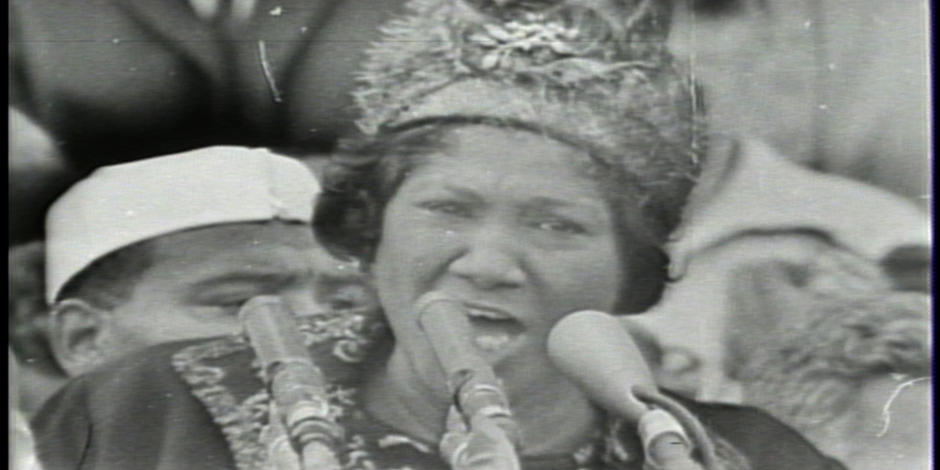
The poignant and soul-searching scene in the movie ‘Selma’ when Dr. Martin Luther King Jr. calls gospel legend Mahalia Jackson in the dead of night and asks her to sing to him to bolster his sagging spirits frames not the moment, but the civil rights movement. The song Jackson renders, ‘Precious Lord,’ is one that embodies the Black liberation struggle in America and represents the deeply embedded faith of Blacks in a divine authority able to reconcile our earthly oppression. Written by noted composer Thomas A. Dorsey, the song offers comfort to the battle weary and reminded Blacks fighting Jim Crow that no matter the circumstances, God ultimately speaks with authority.
Precious Lord, take my hand
Lead me on, let me stand
I'm tired, I'm weak, I'm lone
Through the storm, through the night
Lead me on to the light
Take my hand precious Lord, lead me home
The performance of the song by R & B artist Beyoncé at the Grammy Awards has generated much controversy; driven mainly by public opinion of the popular performer. A very vocal contingent expressed their dissatisfaction with the selection of Beyoncé to sing ‘Precious Lord,’ suggesting the honor should have been given to the talented vocalist Ledisi who portrayed Mahalia Jackson in the movie. Holding the opposite opinion are the legions of Beyoncé fans. In the minds of ‘Bey’s followers there was no one else who could deliver a Grammy worthy ‘performance’ of the song.
And thus, the disconnect. ‘Precious Lord’ cannot be performed. It must be felt and exhaled. There is struggle in this song, the admission of weariness and the pleading for mercy. It is a song that embodies the Black experience in our nation and conjures up images of striped backs tilling fields in the hot southern sun and brave Black children walking a gauntlet of hate to enter a school house door. Such experiences can’t be performed. They must be a reflection of consciousness.
Some songs matter beyond the notes on the sheet music and Dorsey’s classic is one of them. The reaction to Beyoncé was more than just expressions of dislike of the artist; it was an acknowledgment of a song’s significance to our American experience. As a child, listening to the recording of Mahalia Jackson sing ‘Precious Lord’ reminded me of the suffering and courage of my people. The song was ‘church’ before I entered the sanctuary on Sunday morning and a solemn prayer framed by a movement unfolding in our nation. Dr. King realized the healing power of Dorsey’s masterpiece and when a moment of decision arrived the civil rights icon needed to hear Jackson reaffirm his faith through song. The subtle yet powerful singing of Ledisi in ‘Selma’ captures the essence of ‘Precious Lord’ and the intimacy of the song to those seeking reassurance when traveling through the ‘valleys of the shadows of death.’ Dr. King could have asked the great songstress to sing any song but he chose the one that allowed him to hear the ‘voice’ of God in his hour of need; when prayer alone was insufficient and the leader needed the comfort of song. It was a scene in the movie that touched me deeply because it conveyed King’s isolation, his vulnerability and self-doubt, and the burden of leadership.
The National Academy of Recording Arts and Sciences (NARAS), the organization that awards the Grammys every year, missed a unique opportunity to use the power of the arts to convey a message of healing at a time when the nation is backsliding on justice. The release of ‘Selma’ coincides with a growing movement challenging police brutality, episodes of violence in communities throughout the nation, and multiple incidences of wrongful convictions of Black men being overturned. So called ‘Millennials’ have no personal connection to the civil rights movement, can’t fathom an America that functioned on statutory hate and view the period as simply another chapter in history. What makes the movie relevant to this generation is its context in the current environment. Perhaps the choice of Beyoncé was meant to make that connection. If so, it was an understandable choice but I think it missed the mark. There were other more creative ways for NARAS to honor the movie, highlight the song and use its platform to focus the nation on the unfinished business of justice and equal rights.
What this incident really reveals is the power of gospel music, the unbreakable link between faith and justice, and the magnitude of symbolism in the electronic age. We waste time bashing an obviously gifted artist if we fail to grasp that the very disappointment some might feel regarding Beyoncé’s performance is a testament to the need for the healing balm of “Precious Lord’ and a genre that lifts us above the difficulties of present circumstances and assures us that God has the final say.
Walter Fields is Executive Editor of NorthStarNews.com.












